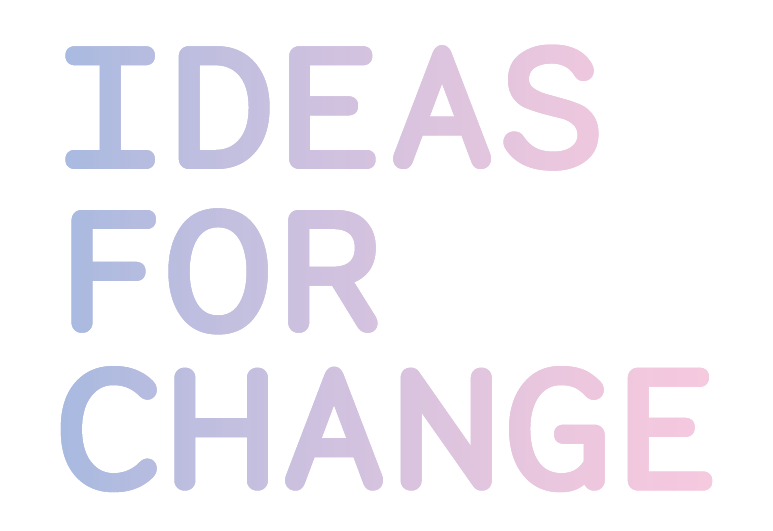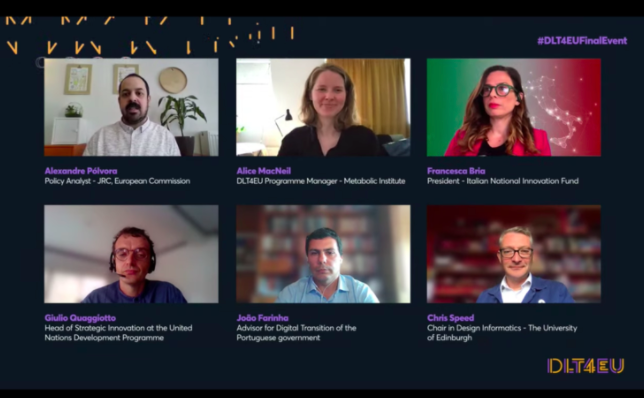DLT4EU says goodbye to its acceleration programme for the common good
By the editorial team. (Originally published in Spanish)
Every project comes to an end, and DLT4EU is no exception. After months of work, learning and, above all, compelling challenges, the pioneering acceleration programme which promotes the adoption of DLT –Distributed Ledger Technology– solutions in the public sector, funded by the European Commission, has come to an end. Which teams have received extra funding to develop their proposals? Have they discovered whether these technologies can really address environmental and social problems? Read on to find out the answers!
A TV event to bid farewell to a pioneering programme
On May 6th, together with our partners Metabolic and Digital Catapult, we held the final event of the project. A day that, although it took place virtually, captured the emotion of gathering the entire community that has made this project possible.
The event hosted a panel discussion with experts on the use of technologies for the common good, including Francesca Bria, President of the Italian Innovation Fund, Giulio Quaggiotto, Head of Strategic Innovation at the United Nations Development Programme (UNDP), Fabrizio Sestini, Senior Digital Social Innovation at DG CONNECT, João Farinha, Advisor for the Portuguese Secretary of State for Digital Transition, Chris Speed, Chair of Design Informatics at the Edinburgh College of Art and Alexandre Pólvora, Policy Analyst at the JRC European Commission Science Hub.
All of them shared the need to encourage more programmes like DLT4EU, which advance experimentation and help transform society by driving innovation with impact in the public and social sectors. In particular, the development of solutions of the DLT4EU programme was approached through the use of blockchain and are available in Open Source. During the meeting, they also highlighted the value of creating a European model of digital sovereignty that tackles climate impact and preserves citizens’ rights.
However, the protagonists of the day were the 8 accelerator teams that have worked for months to solve challenges related to circular economy and digital citizenship through DLT solutions. After a long deliberation by a jury of experts in the field, three of them were chosen by the programme for their contribution to the common good and received extra funding to develop their projects.
Reusing electronic devices to tackle the digital divide
The circular consumption system for electronic devices for the Sant Boi City Council developed by the Spanish association Ereuse was one of the winning solutions of the programme. The initiative promotes the reusal and extends the life cycle of computer and other electronic equipment by distributing them to schools and families in vulnerable situations. The process is based on a peer-to-peer DLT technology platform that coordinates the refurbishment of devices that are no longer being used, measures the level of circularity and reduces the environmental impact and the digital divide in the city.
The NGO impact-reporting revolution
UK platform Alice.si, in partnership with the Digital Future Society, has been awarded for its data and automation system, a solution that simplifies humanitarian agencies’ reporting and verification processes. The technology improves impact reporting capabilities for the Instant Networks School, led by the Vodafone Foundation, UNHCR and the UN Agency, to facilitate digital education for young refugees in Africa. The process incorporates artificial intelligence and predicts the performance of the programme so that the reporting costs are eliminated. An innovative and pioneering idea that benefits transparency and justification of results in humanitarian development programmes.
DLTs to enhance the value of women’s cooperatives in Morocco
The third awarded solution of the programme is the digital passport of the international company Convergence.tech, which facilitates the direct trade of argan oil between women’s cooperatives in Morocco and the countries where there’s most demand, mostly in Europe. Through DLTs, this system helps improve the market and shortens supply chains between exporters and buyers. A challenge, set by the UNDP (United Nations Development Programme) Alternative Finance Laboratory and UNDP Morocco, which generates a positive impact on the industry and stimulates the local economies.
DLT beyond the technology
One of the most valuable lessons learned from the DLT4EU project is that distributed technologies can generate benefits not only at the digital economic level, but also at the social one.
Circular consumption of electronic devices reduces the environmental impact and helps distribute these resources equitably, so that everyone can benefit from them. Simplifying the verification processes of humanitarian organisations facilitates their work, improves their public image by making their actions transparent and helps to shine a light on their job. Finally, platforms that shorten supply chains create more resilient and sustainable businesses and highlight the work of disadvantaged groups such as women entrepreneurs who are still undervalued in many countries and sectors. The programme we have had the pleasure of promoting has recognised just a few examples of the good use of DLT technologies for the common good, but the potential of them is still vast.
After a year and a half of intense work, DLT4EU is over, but its ecosystem is still active. We are grateful for the great work of all the teams that have participated in the accelerator by contributing with their ideas to the challenges and to the consortium and experts behind the project. Great challenges require extraordinary solutions and teams and we are extremely proud to have been able to contribute to these achievements.
Keep reading:
Did you like this article?
Receive more content like this in your inbox!












